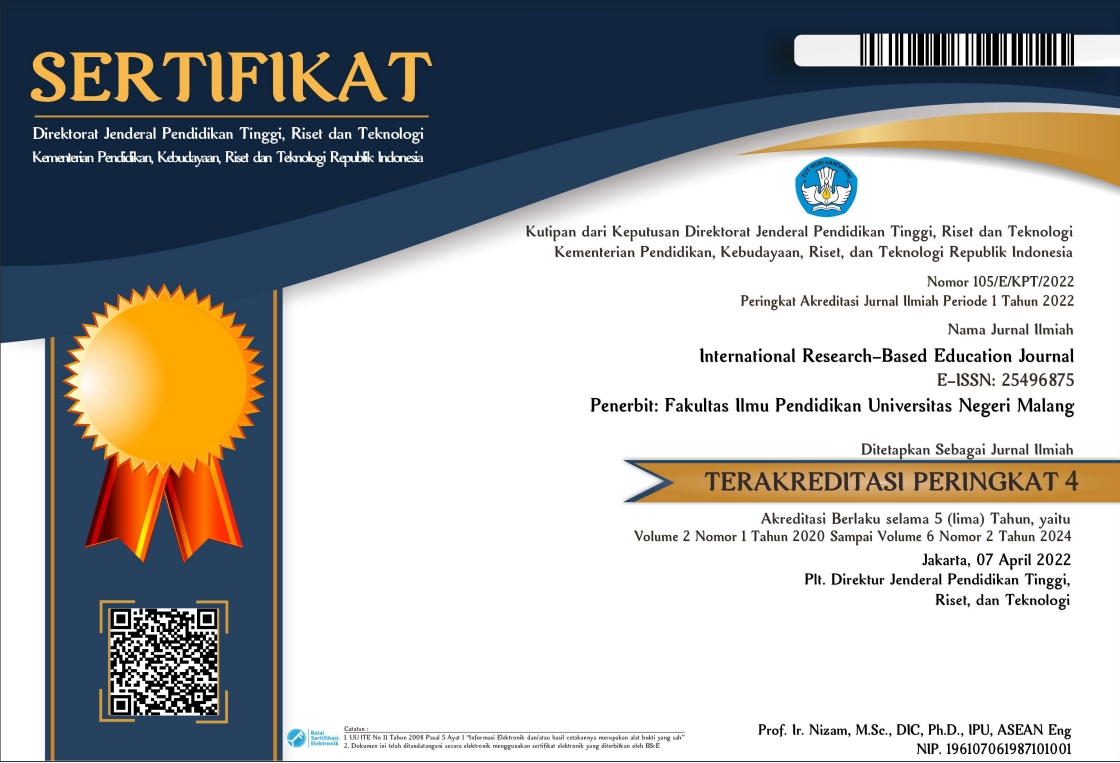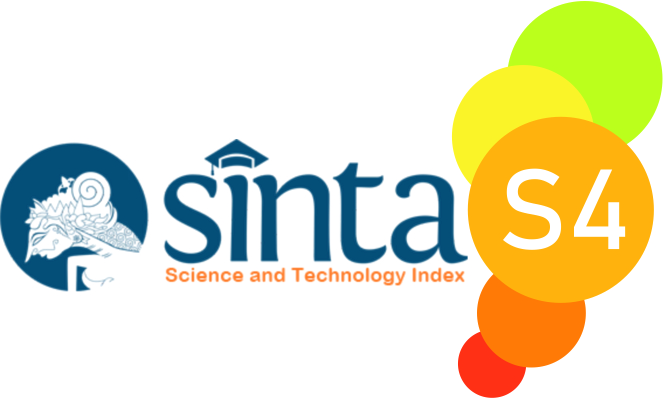Sustainable Career Development of The Senior High School Educators
Abstract
This paper aimed to describe how educators explore their career to achieve the goals which have been set beforehand. It also attempted to provide a clear image of different career strategies which have been implemented by the educators at schools. This study used qualitative approach by employing the multi-case study design. Data was analyzed using the constant comparative method. The result indicated some differences were found at the stage of career exploration. Furthermore, at the stage of determination of career goals, the educators had been determined to commit to their organizational or professional growth.
Keywords: career development, educators, career exploration, career goals, career strategies.
Keywords
Full Text:
PDFReferences
Bakar, A.R., et.al. 2014. So You Want To Be A Teacher: What Are You Reason. Journal International Education Studies, 7 (11), 155-161.
Bogdan, R. C & Biklen, S. K. 1998. Qualitative Research for Education: An Introduction to Theory and Method. Boston: Allyn and Bacon, Inc.
Cheung, R., & Arnold, J. 2014. The Impact of Career Development Among Hongkong Chinese University Student. Journal of College Student Development, 55 (7), 732-748.
Claudia, V. 2015. The Role of Motivation in the Development of School Teachers’ Career. Social and Behavioral Science, 180, 1109-1115.
Creed, P. A., & Hughes, T. 2012. Career Development Strategies as Moderators between Career Compromise and Career Outcomes in Emerging Adults. Journal of Career Development, 40 (2), 146-163.
Eren, A. 2012. Perspektive Teachers’ Interest in Teaching, Professional Plans about Teaching and Career Choice Satisfaction: A Relevant Framework? Australian Journal of Education, 56 (3), 303-318.
Greenhaus, J. H., & Callanan, G. A. 2006. Encyclopedia of Career Development. Volume 1. London: Sage Publication. Inc.
Greenhaus, J. H., & Sklarew, N. D. 1981. Some Sources and Consequences of Career Exploration. Journal of Vocational Behavior, 1(1), 1-12.
Hanson, E. M. 2003. Educational Administration and Organizational Behavior. Fifth Edition. Boston: Pearson Education, Inc.
Khan, W. A. 2003. Teaching Motivation. New Delhi: Discovery Publishing House.
Korsakiene, R., & Smaliukiene, R. 2014. The Implications of Contemporary Approaches Toward Career Development. Journal Social and Behavioral Science, 109 (1), 422-426.
Latham, G. P., Stajkovic, A. D., & Locke, E. A. 2010. The Relevance and Viability of Subconscious Goals in the Workplace. Journal of Management, 36 (1), 234-255.
Locke, E. A., & Latham, G. P. 2006. New Direction in Goal-Setting Theory, Journal Current Directions in Psychological Science, 15 (5), 265-268.
Luzzo, D. A., & McGregor, M. W. 2001. Practice and Research in Career Counseling and Development, (Online). Journal of Vocational Behavior, 50 (1), 98-139.
McDonald, K. S., & Hite, L. M. 2005. Reviving The Relevance of Career Development in Human Resource Development. Human Resources Development Review, 4 (4), 418-439.
Miles, M.B, Huberman, A. M., & Saldana, J. 2014. Qualitative Data Analysis: A Methods Sourcebook (Third Edition). London: Sage Publication, Inc.
Nazli, S. 2007. Career Development in Primary School Children. Career Development International, 12 (5), 446-462.
Noe, R. A. 1996. Is Career Management Related to Employee Development and Performance? Journal of Organizational, 17 (1), 119-133.
Okamura, Y., & Miller, J. 2010. Career Development Strategies for Japanese Immigrant Teachers. Australian Journal of Career Development, 19 (3), 33-42.
Pace, R. W., Smith, P. C., & Mills, G. E. 1991. Human Resources Development. New Jersey: Prentice Hall, Englewood Cliffs.
Purwanto, E. 2012. Factors Affecting Career Exploration of the Junior High School Students, Online, Jurnal Cakrawala Pendidikan, 2 (1), 228-243.
Shi Hu, Hood, M., & Creed, P. A. 2016. Career Goal Importance as a Moderator in Relationship between Career Feedback and Career-Related Stress. Journal of Career Development. First Published 21 September 2016.
Strom, P. S., Strom, R. D., Whitten, L. S., & Kraska, M. F. 2014. Adolescent Identity and Career Exploration. NASSP Bulletin, 98 (2), 163-179.
Studer, J. R. 2015. The Profesional School Counselor: An Advocate for Student. Belmont, CA: Thomson Brooks.
Stumpt, S. A., Austin, E. J., & Harman, K. 1984. The Impact of Career Exploration and Interview Readiness on Interview Performance and Outcomes. Journal of Vocational Behavior, 24 (1), 221-235.
Sudjana, N. 2006. Quality Standards of Supervisors. Jakarta: Depdiknas.
Taveira, M. D. C., & Moreno, M. L. R. 2003. Guidance Theory and Practice: The Status of Career Exploration. British Journal of Guidance and Counseling, 31(2), 189-207.
Tomlinson, J. et.al. 2012. Structure, Agency and Career Strategies of White women and Black and Minority Ethnic Individuals in The Legal Profession. Journal Human Relations, 66 (2), 246-269.
Toygar, S., & Ergun, Y.A. (2012). Career Goals of a Private Hospital Nurses and Career Opportunities Offered to Them. Journal Social and Behavioral Sciences, 47 (1), 1668-1674.
Wilson, E., & Deaney, R. 2010. Changing Career and Changing Identity: How do Teacher Career Changer Exercise Agency in Identity. Social Psychology Education Journal, 13 (1), 169-183.
Wiyono, B. B. 2017. The Effect of Self-evaluation on The Principals’ Transformational Leadership, Teachers’ Work Motivation, Teamwork Effectiveness, and School Improvement. International Journal of Leadership in Education, 1-21.
Yarnall, J. (2008). Strategic Career Management: Developing Your Talent. New York: Butterworth-Heinemannis an Imprint of Elsevier.
Yu¨ce, K., Esin Y. S., Koc¸er, A.O, dan Kana F. 2013. Motivations for Choosing Teaching as a Career: a Perspective of Pre-service Teachers from a Turkish Context. Journal Asia Pacific Education, 14, 295-306.
Zikic, J. & Klehe, U.C. 2006. Job Loss as a Blessing in Disguise: The Role of Career Exploration and Career Planning in Predicting Reemployment Quality. Journal of Vocational Behavior, 69, 391-409.
DOI: http://dx.doi.org/10.17977/um043v1i2p153-161
Refbacks
- There are currently no refbacks.

This work is licensed under a Creative Commons Attribution-NonCommercial-ShareAlike 4.0 International License.










1.png)



